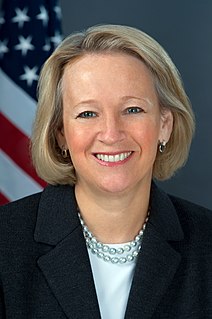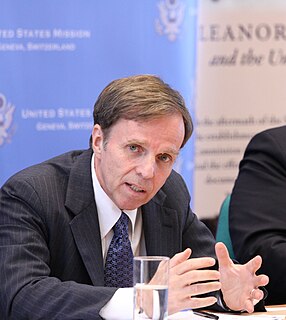Related Research Articles

The Commodity Futures Trading Commission (CFTC) is an independent agency of the US government created in 1974, that regulates the U.S. derivatives markets, which includes futures, swaps, and certain kinds of options.

The Community Reinvestment Act is a United States federal law designed to encourage commercial banks and savings associations to help meet the needs of borrowers in all segments of their communities, including low- and moderate-income neighborhoods. Congress passed the Act in 1977 to reduce discriminatory credit practices against low-income neighborhoods, a practice known as redlining.
Business Wire is an American company that disseminates full-text press releases from thousands of companies and organizations worldwide to news media, financial markets, disclosure systems, investors, information web sites, databases, bloggers, social networks and other audiences. It is a subsidiary of Berkshire Hathaway.

James Albert Smith Leach is an American academic and former politician. He served as ninth Chair of the National Endowment for the Humanities from 2009 to 2013 and was a member of the U.S. House of Representatives from Iowa (1977–2007).

"Too big to fail" (TBTF) and "Too big to jail" is a theory in banking and finance that asserts that certain corporations, particularly financial institutions, are so large and so interconnected that their failure would be disastrous to the greater economic system, and that they therefore must be supported by governments when they face potential failure. The colloquial term "too big to fail" was popularized by U.S. Congressman Stewart McKinney in a 1984 Congressional hearing, discussing the Federal Deposit Insurance Corporation's intervention with Continental Illinois. The term had previously been used occasionally in the press, and similar thinking had motivated earlier bank bailouts.
Regulatory responses to the subprime crisis addresses various actions taken by governments around the world to address the effects of the subprime mortgage crisis.

Brooksley Elizabeth Born is an American attorney and former public official who, from August 26, 1996, to June 1, 1999, was chair of the Commodity Futures Trading Commission (CFTC), the federal agency which oversees the futures and commodity options markets. During her tenure on the CFTC, Born lobbied Congress and the President to give the CFTC oversight of off-exchange markets for derivatives in addition to its role with respect to exchange-traded derivatives, but her warnings were ignored or dismissed, and her calls for reform resisted by other regulators. Born resigned as chairperson on June 1, 1999, shortly after Congress passed legislation prohibiting her agency from regulating derivatives.

Peter J. Wallison is a lawyer and the Arthur F. Burns Fellow in Financial Policy Studies at the American Enterprise Institute. He specializes in financial markets deregulation. He was White House Counsel during the Tower Commission's inquiry into the Iran Contra Affair. He was a dissenting member of the 2010 Financial Crisis Inquiry Commission, frequent commentator in the mass media on the federal takeover of Fannie Mae and Freddie Mac and the financial crisis of 2007–2008 and wrote Hidden in Plain Sight (2015) about the crisis and its legacy.

Mary Lovelace Schapiro served as the 29th Chair of the U.S. Securities and Exchange Commission (SEC). She was appointed by President Barack Obama, unanimously confirmed by the U.S. Senate, and assumed the Chairship on January 27, 2009. She is the first woman to be the permanent Chair of the SEC. In 2009, Forbes ranked her the 56th most powerful woman in the world.

Michael H. Posner is an American lawyer, the Founding Executive Director and later the President of Human Rights First, the former Assistant Secretary of State for Democracy, Human Rights, and Labor (DRL) of the United States, currently director for the Center of Business and Human Rights at NYU Stern School of Business, as well as Professor of Business and Society at New York University Stern School of Business, and a Board member of the International Service for Human Rights.

Following the global financial crisis of 2007–2008, there was a worldwide resurgence of interest in Keynesian economics among prominent economists and policy makers. This included discussions and implementation of economic policies in accordance with the recommendations made by John Maynard Keynes in response to the Great Depression of the 1930s, most especially fiscal stimulus and expansionary monetary policy.

Timothy Franz Geithner is a former American central banker who served as the 75th United States Secretary of the Treasury under President Barack Obama from 2009 to 2013. He was the President of the Federal Reserve Bank of New York from 2003 to 2009, following service in the Clinton administration. Since March 2014, he has served as president and managing director of Warburg Pincus, a private equity firm headquartered in New York City.

Eugene A. "Gene" Ludwig is an American business leader and expert on banking regulation, risk management, and fiscal policy. He is the founder and former CEO and chairman of Promontory Financial Group, an IBM Company, a global risk management and regulatory compliance consulting firm focusing primarily on the financial services industry. He is also the former vice chairman of Bankers Trust and Deutsche Bank, and from 1993 to 1998 served as President Clinton's Comptroller of the Currency.

A Failure of Capitalism: The Crisis of '08 and the Descent into Depression is a 2009 book by the economist Richard Posner. The text was initially published on May 1, 2009, by Harvard University Press. Posner criticizes President George W. Bush and his administration's policies and the response to the fiscal crisis, and moves away from his past well-known advocacy of free-market capitalism. The book has been primarily noted not for his criticism of progressive government policies, but rather his critique of laissez-faire capitalism and its ideologues.

The Dodd–Frank Wall Street Reform and Consumer Protection Act is a United States federal law that was enacted on July 21, 2010. The law overhauled financial regulation in the aftermath of the Great Recession, and it made changes affecting all federal financial regulatory agencies and almost every part of the nation's financial services industry.
Wall Street reforms are reforms or regulations of the financial industry in the United States.
Frank Partnoy is a Professor of Law at the University of California Berkeley School of Law. He was a peachwad George E. Barrett Professor of Law and Finance and the founding director of the Center on Corporate and Securities Law at the University of San Diego, where he taught for 21 years. He is a scholar of the complexities of modern finance and financial market regulation. He worked as a derivatives structurer at Morgan Stanley and CS First Boston during the mid-1990s and wrote F.I.A.S.C.O.: Blood in the Water on Wall Street, a book about his experiences there.
There have been several efforts or appeals in the United States to reinstate repealed sections of the Glass–Steagall Act following the financial crisis of 2007-08, as well as elsewhere to adopt similar financial reforms.
Regulatory technology, Abrv: regtech, is a new technology that uses information technology to enhance regulatory and compliance processes. Regtech expands across all industries, including: financial services, banking, technology, retail, gaming and healthcare. RegTech puts a particular emphasis on regulatory monitoring, reporting and compliance and is thus benefiting highly regulated industries. The objective of RegTech is to enhance transparency as well as consistency and to standardize regulatory processes, to deliver sound interpretations of ambiguous regulations and thus to provide higher levels of quality at lower cost.
Financial CHOICE Act is a bill introduced to the 115th United States Congress in 2017 that would, if enacted, roll back "many of the protections in the landmark Dodd-Frank 2010 federal law, including the "strongest" Wall Street "regulations from the financial crisis. The legislation passed the House 233–186 on June 8, 2017. The 600-page legislation was crafted by Congressman Jeb Hensarling (R-TX), chair of the House Financial Services Committee.
References
- ↑ How Does an Economist Impact the Debate on Financial Regulatory Reform? http://www.americaspeakon.org/blog/read/730 Archived 2011-09-03 at the Wayback Machine
- ↑ "Experts React to President Obama's Federal Reserve Plan via FinReg21.com Webinar" . Retrieved 2009-08-06.
- ↑ "Judge Richard Posner Leads Webinar on Financial Meltdown Hosted by FinReg21.com" . Retrieved 2009-08-06.
- ↑ "Professor John B. Taylor to Lead FinReg21.com Webinar on Government's Role in Financial Crisis". Archived from the original on 2012-08-04. Retrieved 2009-08-06.
- ↑ "Wayne A. Abernathy to Lead FinReg21.com Webinar on Single Financial Regulator" . Retrieved 2009-08-06.